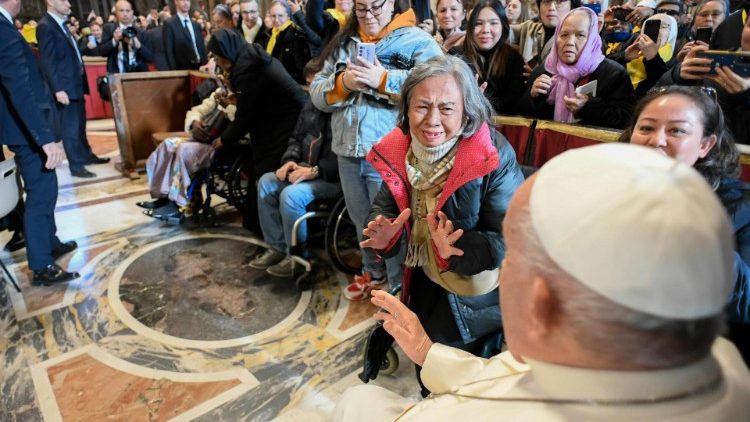‘Look people in the eyes, touch their hands when giving alms,’ says Pope
Today, the 8th Day of the Poor, Bergoglio dedicated his homily from St Peter's Basilica to the weak and excluded. In the encounter with them, the risk is "not to notice the presence of God". Faith must not be "harmless devotion". Recalling the words of Card. Martini: 'Church is such to the extent that it serves the poor'. Today the Pontiff's lunch in the Aula Nervi alongside 1,300 poor people with the Italian Red Cross.
Vatican City (AsiaNews) - "I was looking at a photograph that a Roman photographer took: they were coming out of a restaurant, an adult couple, almost elderly, in winter; the lady well covered with fur and the man as well. At the door, there was a poor lady, lying on the floor, begging and they both looked the other way... This happens every day".
Today, VIII World Day of the Poor, during the homily recited in St Peter's Basilica at the 10am Mass, Pope Francis dwelt on the duel between "anguish and hope" that takes place in the heart of each person. In fact, just as today's Gospel (Mk 13:24-32) tells of the "sun going dark and the moon going out", our time too is marked by "drama": "Hunger and famine oppress so many brothers and sisters who have nothing to eat, we see the horrors of war, we see the innocent deaths". Thus, as happens to the Roman couple in the photograph, there is the risk in the face of so much suffering of "sinking into discouragement and not realising the presence of God". But Jesus 'opens up the horizon, widens our gaze', ignites hope, even in an 'apocalyptic picture'.
The lunch with 1,300 poor people in Paul VI Hall in the Vatican is the symbol of this day - with the theme "The prayer of the poor rises up to God" (cf. Sirach 21:5) -, which the Holy Father experienced after the recitation of the Angelus, together with the Italian Red Cross. "The poor cannot wait," he told the faithful gathered in St Peter's Square this morning. The meal was coordinated by the Dicastery for Charity, while the Dicastery for Evangelisation will provide for the needs of the most needy with various charitable initiatives. "I thank those in the dioceses and parishes who have promoted initiatives of solidarity with the most needy," Bergoglio said from the window of the Vatican Apostolic Palace after the recitation of the Marian prayer. "I ask a question, everyone can ask this question to themselves: do I deprive myself of something to give it to the poor? And do I, when I give alms, touch the poor man's hand and look him in the eye?" these were the Pontiff's questions.
"While a part of the world is condemned to live in the slums of history, while inequality grows and the economy penalises the weakest, while society devotes itself to the idolatry of money and consumption, it happens that the poor, the excluded cannot do anything but continue to wait," he said during his homily. In this context undermined by indifference and selfishness, the Christian faith risks detaching itself from charity, and becoming a 'harmless devotion'. It is the words of Cardinal Martini, which Francis recalled at the end of his speech in the largest Papal Basilica, that indicate the need to heal this disconnect. "He said that we must be careful to think that there is first the Church, already solid in itself, and then the poor we choose to care for. In reality, we become the Church of Jesus to the extent that we serve the poor,' said the Bishop of Rome.
An urgency that, starting from hope, must be taken on by each Christian person, because 'where there seems to be only injustice, pain and poverty, precisely at that dramatic moment, the Lord comes close to free us from slavery and make life shine. In fact, the Kingdom of God is realised if one puts forth an "industrious faith in charity". For this there is a need for "Christians who do not turn away". Faith is not "spirituality that flees from the world but - on the contrary - a faith that opens its eyes to the suffering of the world and the unhappiness of the poor in order to exercise the same compassion as Christ". An action of care that must not be directed only at the great global issues, but "at the little we can all do every day with our lifestyles, with our care and attention for the environment in which we live, with the tenacious search for justice, with the sharing of our goods with those who are poorer".
"I say this to the Church, I say it to governments, I say it to international organisations, I say it to each and everyone: please, let us not forget the poor," he added. At the end of the speech that followed the Angelus, the Pope asked for prayers for peace "in the tormented Ukraine, in Palestine, Israel, Lebanon, in Myanmar, in Sudan". A concern that the Holy Father never renounces. "War makes people inhuman and induces them to tolerate unacceptable crimes. May the rulers listen to the cry of the peoples who ask for peace,' is the appeal addressed to those who are called to lead the nations that suffer from the violence of conflict.







.png)










